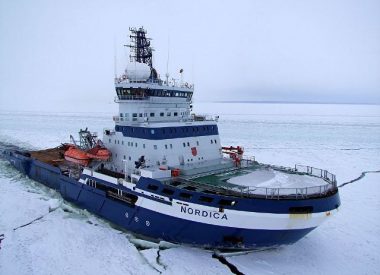
Icebreaker completes earliest transit of once-forbidding Northwest Passage
by The Associated Press

Climate change is opening up sea ice along the fabled Arctic route earlier each summer. If current warming levels continue, the passage will be largely ice-free by 2050

The 24-day journey concluding July 29 was the earliest in the summer any ship has traveled across the Arctic route. PHOTO: Cornelia Klier/Wikimedia
NUUK, Greenland—After 24 days at sea and a journey spanning more than 10,000 kilometres (6,214 miles), the Finnish icebreaker MSV Nordica has set a new record for the earliest transit of the fabled Northwest Passage.
The once-forbidding route through the Arctic, linking the Pacific and the Atlantic oceans, has been opening up sooner and for a longer period each summer due to climate change.
Sea ice that foiled famous explorers has slowly been melting away in one of the most visible effects of man-made global warming.
Canada’s Department of Fisheries and Oceans says the previous earliest passage happened in 2008, when the Canadian Coast Guard ship Louis L. St-Laurent left St. John’s in Newfoundland on July 5 and arrived in the Beaufort Sea off Point Barrow on July 30.
The Nordica, with a team of scientists and Associated Press journalists on board, completed a longer transit in less time, setting off from Vancouver on July 5 and reaching Nuuk, the capital of Greenland, on Saturday, July 29.
It was an often-lonely journey across the Northwest Passage.
While the MSV Nordica icebreaker encountered Chinese cargo vessels, Alaskan fishing boats and a German cruise ship in the Pacific, upon entering the Canadian Archipelago, the ship travelled alone. Radar indicated the presence of the U.S. Coast Guard cutter Sherman near Point Barrow. Along the coast, an occasional collection of houses revealed evidence of human settlement in the far north.
Yet for the most part, the ship’s only companions were Arctic sea birds, seals and the occasional whale, until two-thirds of the way through the voyage, as Nordica was plowing through sea ice in Victoria Strait, a crew member sighted a polar bear.
These animals have come to symbolize the threat posed to Arctic wildlife by climate change because the sea ice they depend on for hunting is disappearing a bit more each year. Scientists predict the Northwest Passage will be largely ice free in the summer by 2050 if current levels of warming continue.
For now, transiting the Northwest Passage remains a challenge for conventional ships and efforts are being made to prevent frozen waterways, which the local Inuit depend on for travel, from being opened up. Still, tourism and other forms of economic development are already underway.